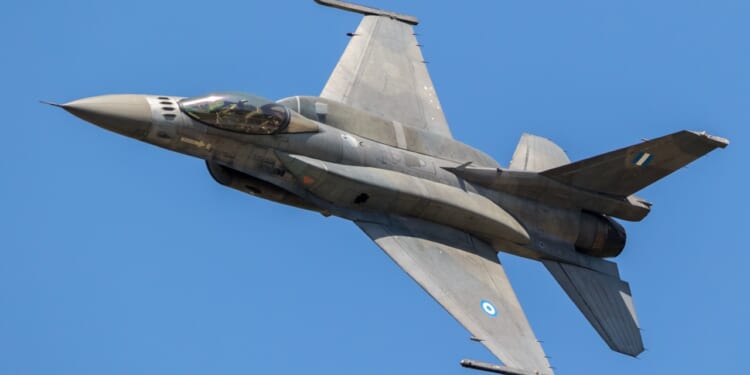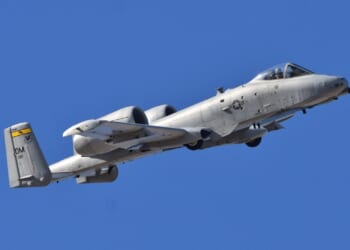The Greek government has sought to strengthen the Hellenic Air Force in response to Turkey, which appears on track to rejoin the F-35 Lightning II program in the near future.
On Tuesday, the Hellenic Air Force received the latest updated F-16 Fighting Falcon, following the aircraft’s receipt of the “Viper” upgrade. It was the 42nd Fighting Falcon to be upgraded over the past two years via a partnership between Lockheed Martin and the Hellenic Aerospace Industry (HAI), the largest aviation firm in Greece. It also marks the halfway point for the ongoing program, which calls for its entire fleet of F-16s to receive the upgrade, with the goal of completing the work by 2027.
“The F-16 Viper enhances interoperability within NATO, improves operational effectiveness, and strengthens Greece’s role in the security of the wider region,” said Mike Shoemaker, vice president of Lockheed Martin’s Integrated Fighter Group.
In total, 83 to 85 F-16s will be upgraded as part of a $1.05 billion program. The work is being carried out at HAI’s facilities.
Greece Wants to Buy More F-35 Fighters
In addition to upgrading its fleet of F-16s, Athens has also sought to increase its orders for the fifth-generation F-35 Lightning II. Earlier this month, discussions were held with the Greek government regarding whether the Hellenic Air Force should acquire an additional eight to 12 Lightning IIs instead of upgrading the final 36 F-16 Block 50 aircraft, which have been in service for decades.
This isn’t the first time a plan has been considered, and it has been debated for more than five years. The issue involves not only the costs, but also the timeline. The Fighting Falcons could be outfitted with the Viper upgrades within one to 18 months, whereas the F-35s wouldn’t arrive in Greece until after 2030.
However, the issue has gained traction—particularly as Turkey has sought to rejoin the F-35 Lightning II program, nearly a decade after it was famously expelled in 2017 for adopting the Russian-made S-400 Triumf air defense system.
Athens is currently on track to receive 20 F-35s, which are now being manufactured in the United States, with the first aircraft set to be handed over to the Hellenic Air Force in 2028. Still, that doesn’t mean they’ll be flying over the Aegean Sea for a few years after that point, as the initial aircraft will be used for the Greek pilots’ training in the United States.
Turkey Wants F-35s, Too—and Greece Is Concerned
Turkish President Recep Tayyip Erdogan is expected to press US President Donald Trump on how Ankara can rejoin the F-35 program when the two meet at the White House on Thursday. Erdogan traveled to the United States for the United Nations General Assembly, prior to a visit to Washington, DC, for a meeting with Trump.
“At this stage, we will renegotiate this issue,” Erdogan said on Fox News on Monday. “We expect the US to do what it should – both on the F-35s and the F-16s.”
This isn’t the first time Erdogan has pressed a US head of state on the matter—even as Washington and NATO leadership have made clear that Turkey’s adoption of the S-400 continues to block Ankara’s admission into the F-35 program, as it is incompatible with the F-35 and would put the security of the fighter at risk. Turkey has not yet activated its S-400 systems, and rumors abound that it is seeking to dispose of them as a precursor to resuming its F-35 membership.
It was during Trump’s first administration that Turkey was expelled from the program. As a result of the S-400 acquisition, Turkey also faced harsh sanctions under the Countering America’s Adversaries Through Sanctions Act (CAATSA).
Washington and Ankara were unable to resolve the F-35 issue during the Biden administration. However, tensions between the two capitals did ease somewhat; the State Department approved the sale of additional F-16 Fighting Falcons to Turkey, along with modernization kits for the country’s existing fleet. Erdogan may now be looking to Trump to find a way to conclude the deal for the fifth-generation stealth fighters.
Some US Lawmakers Are Nervous About Turkey
It may not just be Trump whom Erdogan needs to convince. Lawmakers on the bipartisan “Congressional Caucus on Hellenic Issues” have signaled that they remain wary of approving F-35 sales to Turkey, particularly as Ankara continues to maintain two batteries of the Russian-made air defense system.
“Upholding CAATSA sanctions is not only a matter of legal compliance but a necessary step to protect American defense assets and reaffirm the US commitment to accountability and rule of law in international relations,” wrote Representatives Gus Bilirakis (R-Florida), Nicole Malliotakis (R-New York), Chris Pappas (D-New Hampshire), and Dina Titus (D-Nevada).
The lawmakers further accused Erdogan of pursuing “military collaboration with the Russian Federation,” which they warned “undermines the security of US defense technology.” They further pointed to the authoritarianism of Erdogan’s government, including his crackdown on the press.
“Rewarding [Turkish President Recep Tayyip] Erdogan’s government without meaningful changes in behavior would set a dangerous precedent and weaken the credibility of US foreign policy,” the lawmakers explained. “The United States must stand firm in defending its laws, its alliances, and the international order.”
About the Author: Peter Suciu
Peter Suciu has contributed over 3,200 published pieces to more than four dozen magazines and websites over a 30-year career in journalism. He regularly writes about military hardware, firearms history, cybersecurity, politics, and international affairs. Peter is also a contributing writer for Forbes and Clearance Jobs. He is based in Michigan. You can follow him on Twitter: @PeterSuciu. You can email the author: [email protected].
Image: Shutterstock / VanderWolf Images.

















